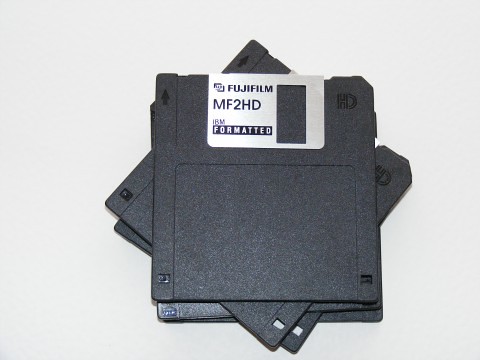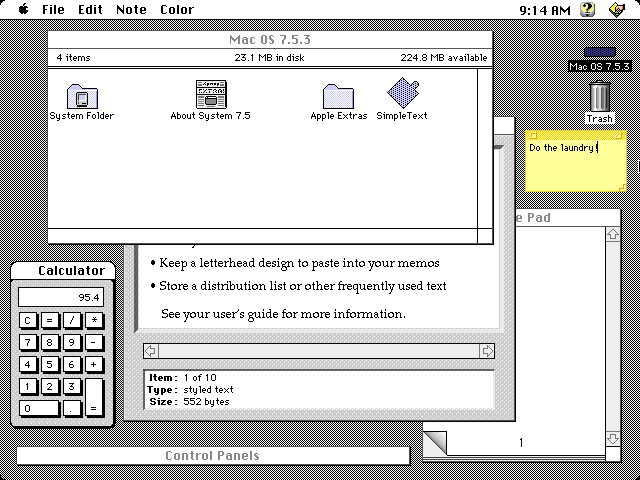In 1996 at Wheelock Elementary School in Lubbock, Texas, were I started my teaching career, K-6 teachers had recently received their first classroom computers. They were Macintosh LC 575s, without CD-ROM drives. They had 5 MB of RAM, they could be upgraded to Mac OS 7.5.3 which supported DHCP (woo hoo)… and they were wonderful.
My 4th grade students not only accessed web content for the first time at school on these computers, they also created HyperStudio projects on them. Since we didn’t have computers in a lab or on a cart which could run productivity or multimedia authoring software (our computer lab still had Apple IIEs at that point) my kids had to scatter around the building to work on their HyperStudio stacks, with their individual floppy disks in hand. Ah, the early days of technology integration!

![]() photo credit: Public Domain Photos
photo credit: Public Domain Photos
Those Mac 575 computers were purchased by our school PTA for a single purpose: Permitting students to take Accelerated Reader (AR) tests. We used them for lots of other purposes (like a gradebook program – THAT was revolutionary!) but AR was the rationale justifying their purchase and introduction into the school. While some students are motivated by AR tests and benefit as a result of the incentives which often accompany those programs, not all are. Dr. Stephen Krashen’s 2003 article in the Journal of Children’s Literature, “Does Accelerated Reader Work? The (Lack of ) Experimental Evidence Supporting the Use of Accelerated Reader” remains (7 years later) a good overview article on the research about AR and reading. Krashen noted:
The research literature has already provided us with some of what we need. There is consistent evidence that those who have more access to books read more (Krashen, 1993), and that those students who are provided with more time to do recreational reading (e.g. sustained silent reading programs) show better gains in reading achievement than comparison students. The effect is especially strong when such programs are allowed to last for one year or longer (Krashen, 1993; 2001; Pilgreen, 2000). On the basis of this research it would be expected that reading management programs that provide reading time and access to books will indeed result in gains in reading comprehension. The issue is whether the addition of tests and rewards makes any difference. In addition, it is important to determine the long-term effects of rewards. A classic argument against the use of rewards is that it affects only short-term behavior (see McLoyd, 1979, discussed below).
Today, in 2010, the anticipated (we might even say faith-based) hope of Accelerated Reader tests improving reading levels among students is re-emerging with a new technological twist: Free cell phones and cell phone minutes for 6th and 7th graders in Oklahoma City. The following is a letter from Oklahoma City Public Schools’ superintendent, Karl Springer, to parents of current sixth and seventh grade students.
OKC Million Program Description
This funded research program from Harvard University is going to provide free cell phones to 1500 6th and 7th grade students in OKCPS who will be randomly selected via a lottery drawing. To be eligible for the lottery, parents must submit an informed consent form which accompanies the superintendent’s letter. Students selected to participate will receive a free cell phone and be placed into one of five different research groups. According to the letter:
Some students will be required to read books and complete quizzes on Accelerated Reader in order to receive minutes. Other students will receive a flat number of minutes for free. Finally, many students will receive inspirational and informative text messages on a daily basis.
Personally, if my son is selected for the program I’m hoping he’ll be placed in the latter group. I’m curious to see what Harvard researchers consider to be “inspirational and informative text messages” for middle schoolers.
In the closing paragraph of his letter to parents, Karl Springer states:
I believe that The Million [this cell phone program and research study] will provide large benefits for our students. I hope you are excited to participate in the program.
From my own 7th grade son’s perspective, this certainly sounds like a good deal. At best, he could get a free cell phone with free minutes. At worst, he wouldn’t be picked for the program – or he’d be selected and get a phone, but have to take some AR tests.
Will the “digital carrot” of cell phones and cell phone minutes “provide large benefits” for the literacy development of Oklahoma City middle school students? Probably not. None the less, someone is going to publish more academic articles and Renaissance Learning is going to get more taxpayer money. History repeats itself.
For more on Stephen Krashen and his insightful ideas about what DOES make a difference to improve literacy and reading skills specifically, check out HIS website and the following past posts here:
- Podcast80: Encouraging Reading by Stephen Krashen (Sept 2006)
- Encouraging Reading by Stephen Krashen (post from Sept 2006)
- The Power of Reading by Dr Stephen Krashen (post from 31 Aug 2006)
Technorati Tags:
cell, city, learning, literacy, mobile, okcps, oklahoma, oklahomacity, phone, read, reader, reading, research, schools, karl, springer, harvard, accelerated, renaissance
If you enjoyed this post and found it useful, subscribe to Wes’ free newsletter. Check out Wes’ video tutorial library, “Playing with Media.” Information about more ways to learn with Dr. Wesley Fryer are available on wesfryer.com/after.
On this day..
- Lesson Cast: Sharing a Class Recording with Minimal Steps – 2020
- Recommendations for Home Hard Drive Backups – 2015
- Playing BowSpleef with a Friend in Minecraft – 2013
- Learning Cool Things at the 2013 Tulsa Mini Maker Faire – 2013
- HDR iPhoneography at Camp USAFA – 2012
- eBooks The New Normal: how libraries are leveraging the eBook opportunity – 2011
- Reach for the Stars Using Media in Your Classroom – 2011
- YouTube Aggregates Videos Shared on a Blog – 2011
- Assignment: Build a personal avatar! – 2010
- Floppy disk, anyone? – 2009


Comments
One response to “If you take more Accelerated Reader Tests, I’ll give you more cell phone minutes”
Great post Wes. Incentives are always funny to watch.